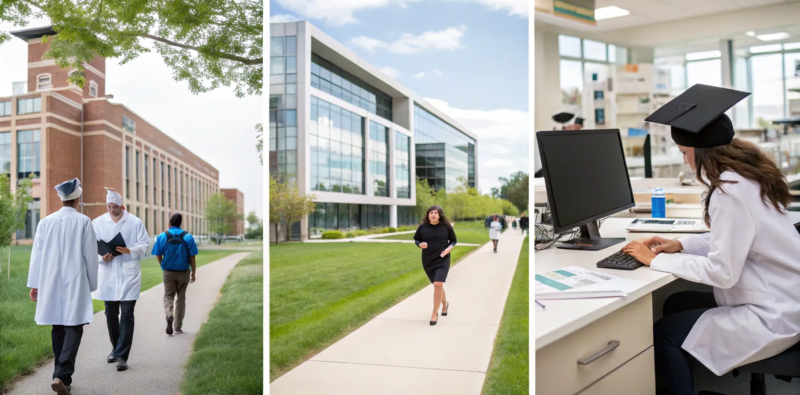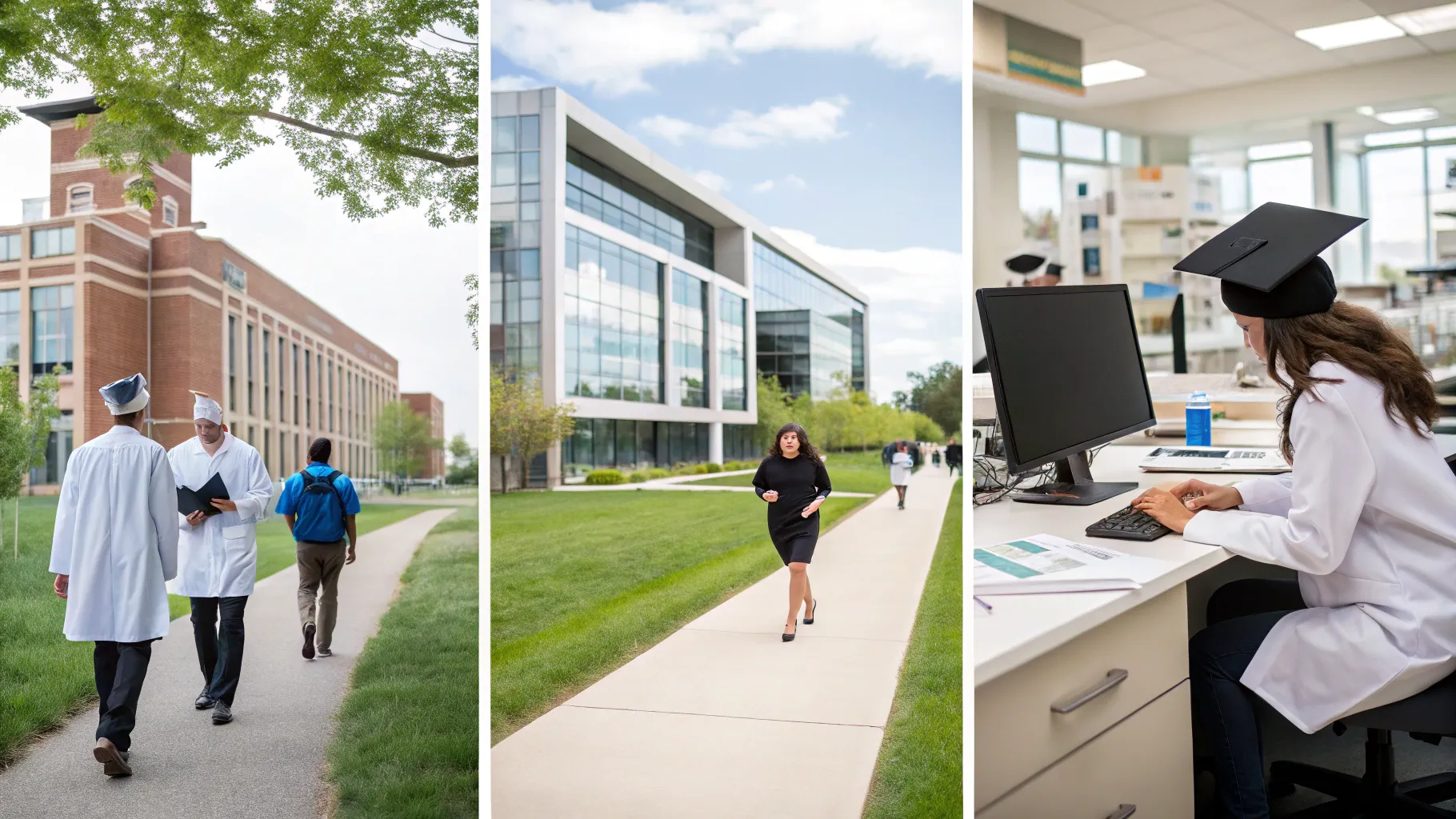
Choosing Your Path: Master’s, PhD, or Postdoc Abroad?

Are you contemplating whether to pursue a Master’s, PhD, or Postdoc abroad? This comprehensive guide explores the pros and cons of each option, tailored specifically for Indian students. Gain insights into how these choices can shape your career and future opportunities.
Table of Contents
- 🤔 Understanding the Dilemma
- 🎓 Master’s Abroad: Is It Worth It?
- 🌍 The Reality of Returning to India
- 📚 Pursuing a PhD: What You Need to Know
- 🏅 Top Countries for PhD Programs
- 🔍 Job Prospects Post-PhD
- 🔍 Considering a Postdoc: Necessary or Not?
- 💼 Job Hunting During Your Postdoc
- 🧭 Verdict: Master’s, PhD, or Postdoc?
- ❓ Engaging with Your Questions
- 💬 Frequently Asked Questions
- 🔗 Stay Connected
🤔 Understanding the Dilemma
Choosing between a Master’s, PhD, or Postdoc abroad can feel overwhelming. Many students find themselves at a crossroads, uncertain about which path to take. It’s crucial to understand the implications of each choice, especially when considering a future career.
First, let’s break down the options:
- Master’s Degree: Typically a 1-2 year program that focuses on advanced knowledge in a specific field.
- PhD: A research-focused degree that can take 3-5 years, often leading to academic or high-level industry positions.
- Postdoc: A temporary position focused on research, usually following a PhD, allowing further specialization.
Understanding your goals will help you navigate this dilemma. Are you looking for immediate job opportunities, or do you aspire to conduct research? Your answers can guide your decision.
🎓 Master’s Abroad: Is It Worth It?
Pursuing a Master’s degree abroad is a popular choice among Indian students. However, it’s essential to evaluate whether it’s truly worth the investment. Here are some points to consider:
- Cost: Studying abroad can be expensive. Tuition, living expenses, and travel costs can add up quickly.
- Career Opportunities: While a Master’s may enhance your skills, returning to India might not yield significant job advantages. Employers often prioritize skills over the degree’s origin.
- Networking: Studying abroad offers valuable networking opportunities, which can be beneficial if you plan to stay in that country.
Ultimately, if you plan to return to India, weigh the benefits carefully. If your goal is to gain international experience, then a Master’s abroad can be worthwhile.
🌍 The Reality of Returning to India
Many students dream of returning to India after completing their studies abroad. However, the reality can be different. Here are some factors to consider:
- Recognition: Employers may not give extra weight to a Master’s from abroad. Skills and experience often take precedence.
- Job Market: The Indian job market is competitive. Having an international degree doesn’t guarantee a job.
- Expectations: Returning students may find that their expectations regarding salary and job roles don’t align with reality.
Before making a decision, research the job market and talk to professionals in your field. This will give you a clearer picture of what to expect.
📚 Pursuing a PhD: What You Need to Know
A PhD is a significant commitment, often taking several years to complete. Here’s what you should know:
- Requirements: Admission often requires a strong academic record, GRE/GMAT scores, and research proposals.
- Research Focus: Choose a university where your research interests align with faculty members. This is crucial for acceptance.
- Funding: Look for scholarships or assistantships that can help cover costs during your studies.
Researching potential programs and supervisors ahead of time can save you time and effort later.
🏅 Top Countries for PhD Programs
When considering a PhD, the choice of country can impact your experience and opportunities. Here are the top countries for pursuing a PhD:
- United States: Offers a wide range of programs and significant funding opportunities.
- Germany: Known for its strong research institutions and no tuition fees for international students.
- Switzerland: High-quality education and research facilities, though living costs can be high.
- United Kingdom: Renowned universities with diverse research opportunities but often higher tuition fees.
- Singapore: Emerging as a hub for research with various funding options available.
- India: While not as internationally recognized, Indian institutions are improving in research capabilities.
Choosing the right country involves considering factors such as funding, language, and cultural fit.
🔍 Job Prospects Post-PhD
After completing a PhD, job prospects can vary widely based on several factors:
- Field of Study: Certain fields have higher demand than others. Research the job market in your area of expertise.
- Experience: Internships or teaching assistantships during your PhD can enhance your employability.
- Networking: Building connections with professionals in your field during your studies can lead to job opportunities.
It’s essential to stay proactive during your PhD journey. Attend conferences, publish research, and connect with industry professionals to improve your job prospects.
🔍 Considering a Postdoc: Necessary or Not?
When it comes to pursuing a postdoc, many students wonder if it’s a necessary step in their career. A postdoc is not just an extension of your PhD; it’s a unique opportunity to deepen your expertise and enhance your research portfolio.
Here are some key points to consider:
- Career Goals: If you aim for a career in academia or high-level research positions, a postdoc can be essential. It helps you build a solid research profile.
- Research Opportunities: A postdoc allows you to work on advanced projects, often leading to publications that are crucial for academic positions.
- Networking: Engaging with established researchers can open doors to future collaborations and job offers.
However, if your goal is to enter the industry, a postdoc might not be necessary. Many industries value practical experience more than additional academic qualifications.
💼 Job Hunting During Your Postdoc
Job hunting during your postdoc can be both exciting and challenging. Here’s how to navigate this phase effectively:
- Start Early: Begin your job search as soon as you start your postdoc. Networking and applications take time, so don’t wait until the last minute.
- Utilize University Resources: Many universities offer career services specifically for postdocs. Take advantage of workshops, resume reviews, and job boards.
- Network Actively: Attend conferences and seminars to meet potential employers. Building relationships can lead to job opportunities.
Remember, while focusing on research is important, balancing job hunting with your postdoc responsibilities is key to a successful transition into your next role.
🧭 Verdict: Master’s, PhD, or Postdoc?
Choosing between a Master’s, PhD, or postdoc can be daunting. Here’s a quick comparison to help you decide:
- Master’s: Best for immediate job opportunities and skill enhancement. Ideal if you want to enter the workforce quickly.
- PhD: A long-term commitment that opens doors to research and academic careers. Suitable for those passionate about their field.
- Postdoc: Ideal for those aiming for high-level research roles or academic positions. It’s more of a job than a course.
Your choice should align with your career aspirations. Reflect on where you see yourself in the future and select the path that best supports that vision.
❓ Engaging with Your Questions
As you ponder your career path, it’s natural to have questions. Here are some common queries students have:
- Is a postdoc necessary for a successful career? It depends on your field and career goals. For academia, it’s often beneficial.
- What if I want to switch fields? A Master’s might be a better option if you’re looking to pivot into a new area.
- How do I choose the right program? Research universities, faculty, and their alignment with your interests.
Feel free to reach out with your questions. Engaging in discussions can provide clarity and guidance.
💬 Frequently Asked Questions
Here are some frequently asked questions that can help clarify your doubts:
- What is the average duration of a postdoc? Typically, a postdoc lasts 1-3 years, depending on the research project.
- Are there funding options for postdocs? Yes, many institutions offer funding or fellowships for postdoctoral research.
- Can I apply for jobs while doing a postdoc? Absolutely! Many postdocs successfully secure jobs during their research tenure.
These questions often arise, but the answers can guide you in making informed decisions about your future.
🔗 Stay Connected
As you embark on this journey, staying connected with peers and professionals is crucial. Here are some ways to do that:
- Join Online Communities: Platforms like LinkedIn and ResearchGate allow you to connect with professionals in your field.
- Attend Workshops and Seminars: These events provide networking opportunities and insights into industry trends.
- Follow Influencers: Keep up with thought leaders in your area of interest for inspiration and guidance.
Building a strong network can provide support and open doors in your career journey. Never underestimate the power of connections!
